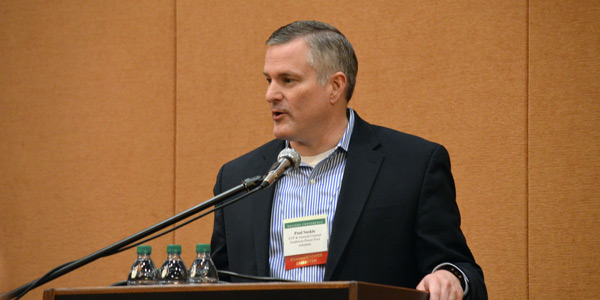By Tom Kleckner
SPP’s Strategic Planning Committee and other stakeholders on Friday reviewed a draft of a staff-written response to FERC’s grid resiliency docket (AD18-7), agreeing that the commission should consider “the roles and relationships of all participants in the electric industry, not just RTOs and ISOs.”
In a conference call, staff invited comment on the draft and said they are considering raising other issues that affect resiliency but aren’t addressed in FERC’s questions.
Among the issues SPP said it intends to raise is whether FERC should involve others in the proceeding. The commission opened the docket in January, after terminating the Department of Energy’s proposed rulemaking that called for cost-of-service payments to coal and nuclear generators to strengthen grid resilience. (See FERC Rejects DOE Rule, Opens RTO ‘Resilience’ Inquiry.)
Staff’s draft response thanks FERC for being able to share its practices and perspective on resilience, but it also urges the commission to widen industry involvement.
“If [grid resilience] is so important to the nation, why are RTOs the only ones looking at it?” SPP General Counsel Paul Suskie asked.
SPP Chairman Jim Eckelberger agreed, suggesting FERC should be looking at the broader picture of how RTOs and ISOs interact with each other.
“If I were FERC, it wouldn’t be just the reliability of each RTO, but how can neighbors help neighbors?” he said. “If the point is efficiency in the national system, it ought to be highlighted.”
SPP is also suggesting that FERC consider cost-allocation and jurisdictional issues and determine who would pay for supplies necessary to protect resilience. SPP is asking for stakeholder feedback by March 2 so it can meet its March 9 filing deadline.
American Electric Power is among those that have already responded with input. AEP’s Jim Jacoby reminded those on the call that the resilience issue began with DOE’s call to protect coal and nuclear plants.
“All of this needs to be based on engineering studies and judgment,” Jacoby said. “We’re not for across-the-board subsidies by fuel type. We think solid fuel, or stored fuel, provides a lot of benefits, but you need to look at where that plant is needed and when it’s needed.”
SPP drafted its initial response using five teams of staff members, each addressing one topic: planning, operations, cybersecurity, compliance/NERC standards and legal/regulatory. The teams focused their work on how RTOs and ISOs should assess threats to resilience, and how SPP mitigates those threats. The teams held a conference call on Feb. 14 with FERC staff to discuss the issues.
“Clearly, we could build a grid where the lights would absolutely not go out,” Suskie said. “But I don’t think the public would want to pay for that.”






